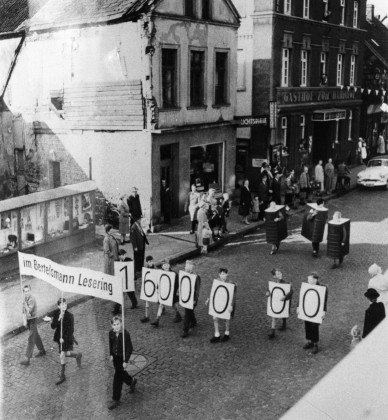Bertelsmann
June 2008, Sina News remarked on Bertelsmann's closure in Chinese market in the following words - "Bertelsmann terminates its business in both online and offline distribution of books, along with Der Club Bertelsmann, which has over 1,500,000 subscribing memberships over the country."
The catalogs that I saw, subscribed by the students in my parents' school, are from Bertelsmann. For 20 RMB, a customer can subscribe for a year-long membership. As a requirement, members should purchase at least one book per season, under designated categories.
This tradition is descended from Bertelsmann's business model from its early days. During the WWII, Bertelsmann became a major publisher for the Nazi party; generating revenues by printing contents populated with Nazi propoganda. After the war, Bertelsmann faced nationwide economic recession. As a strategy to stimulate sales, Bertelsmann founded a book club "Lesering". It re-prints materials after 4-6 months after the initial launch, therefore circumvents national policy of fixed pricing, making book price much lower. This strategy attracted large population of memberships.
In the following decades, Bertelsmann grew into a global player in media industry. In 1997, Bertelsmann entered the Chinese market after initial market research. Its business model is catalog based membership subscription. Before e-commerce became popular, shopping by catalog was a prominent business model. Do you remember television shopping as well?
In 1999, Bertelsmann launched BOLChina, distributing media product online. Although it subsequently closed due to many reasons: the dot come crash, and immaturity of e-commerce market.
Despite the fact that Der Club Bertelsmann is now history, the Bertelsmann corporation is still connected with our daily lives in its dissolvment. According to BAI, Bertelsmann Asia Investments, we see many familiar names. Mobike, a bike sharing company; Douban, a media platform for contents related to music, books, and film; Lagou, a hiring platform. The list continues.






How to Archive Disintegrated Network?
"A digital network is alive, fully in motion, unstable, ever growing, decaying, dying, restarting.How do we publish that?" is a question raised by my colleague Rita from XPUB. She developed a domentation tool to publish network status in its perished form, which we tend to neglect.
To review network in decay is to rewrite digital network's ontology. I didn't think of digital network as alive or deceased beings before. The Internet Archive provided a glimpse to BOLChina's appearance in 2004. As today, BOLChina as a DNS no longer active.